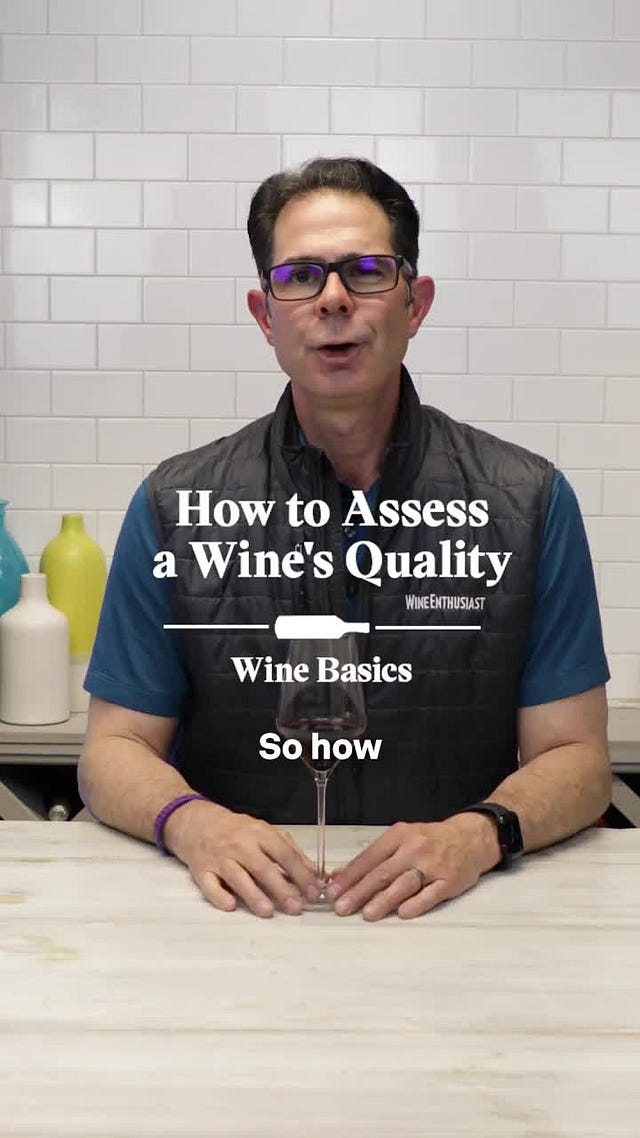Wine Talk: The Quality of "Quality" is Not Strained
Like Mercy, it cannot be forced or coerced onto another. It may not be the same as personal preference, but it cannot escape our personal value judgments.
So, the latest bit of self-inflicted internecine warfare within the wine industry is the debate that "Quality" (with a capital-Q, I suppose) is something that exists outside and independent of individual human perception, and that the industry has in fact been hurt and turned into the lowest-selling category of alcohol worldwide by the younger generations who strive to make wine "more accessible" and less "snobby" or "elitist". And thus, the only way to "save Wine" is to stop saying that Apothic Red is "just as good as" Grand Cru Burgundy1, to stop saying that the only thing that matters is what you personally like. To make sure people who at least wanted to drink that one wine know that they're consuming low-brow, inferior slop.
Since this conversation broke, many in the wine industry have picked up the torch and said what they'd plainly been dying to say their whole fine-wine careers, if only someone, anyone with metaphorical balls could break the ice and make it socially acceptable to say.
And I'm not unsympathetic, to either side. But the fact of the matter is, in both philosophy and psychology, no one has never been able to be convincingly argue that "quality" or value judgments exist outside of subjective, POV criteria. It's true that what we argue to be "qualitative" is not the same as pure personal preference, per se. But that doesn't mean it escapes the event horizon of personal POV-dependence.
Kant vs. Schopenhauer (Yeah, I'm Gonna Prattle On About Old-Guy Philosophy, I Suck)
Kant believed that only an unbiased judgment - in the sense of a pure, objective, and disinterested assessment - can produce an authentic judgment about either aesthetics or morals. If successfully judged independent of personal interests or biases, the judgment would be "universal" and shared by all others, at least those who could approach the object in a similarly bias-free mindset.
Tall order.
Even more tricksy: according to Kant, the "quality" of an object could only be determined through "a priori" synthetic truths, or, in other words, only through our perceptions of the world around us, as we're able to understand them through our faculties. We can know a lot about what our brain projects as the world around us. Of space, and time, and flavor, and aroma. But when it comes to the "Noumena", the objects themselves as they exist outside of our observations, independent of us, we can know nothing.
Literally: nothing. Not. One. Thing.
So we can only find truth about a thing in the presence of a truly unbiased, non-self-interested mind, and even then, it would be truth insofar as this would be how all human brains would translate the truth. So that’s IF (big "if") we could shed all of our biases.
Now, Kant's isn't the only viewpoint on this topic: Arthur Schopenhauer thought differently, but his version doesn't get much better for any Objectivists out there. He thought that the "noumena" could only be known through what he called our "Will", via how the object "motivates" us through our interactions with it. We would know what it was via how we reacted: but our reactions - our "motivations" - would be unique and baked into our being. Schopenhauer believed humans did not have free will in this regard, we did not choose our reactions. Like a doctor's hammer smacking your kneecap, there is only any person's "Will" as it naturally responds to noumena.
So according to Kant, our understanding of reality is entirely dependent on how our individual brain decodes it, and we only agree when/if we could authentically free ourselves of self-interest and bias. According to Schopenhauer, it's based on how we react - uniquely, as individuals - to outside stimuli.
In either case, any given thing would likely not be the same to me, as it is to you.
I Thought We Were Talking About Wine?
Now let's bring this specifically into our understanding of the term "Quality" as it defines a hierarchy of "how good or bad something is", as the Dictionary definition goes.
If one wine is of "higher quality" than another, and if this is somehow different from pure personal preference, there must be a list of criteria for how we are determining this. That list may be things that are objective and fact-based, for example:
more environmentally-friendly grown grapes and vinification practices
more hands-on care by a single person or a very small group of people in every step of the winemaking process.
The above examples are factual - they either happened or they didn't - but any given person still has to overlay a subjective value judgment onto each, in order to declare that these equal higher quality.
This is true for any given element: hand-harvesting, so fewer grapes are split or crushed during picking; selected from vineyards where acidity is higher; or where vine productivity is lower for more flavor concentration; fewer sugars for lower overall alcohol. Many in the artisan wine world have determined that these are "better" qualities, and so = higher quality.
But in all these cases we're using the words "better" and "quality" as synonyms for objective things. Things that mean a higher value TO US, personally.
And others may agree with our assessment, but then others also won't. "Hand-harvested" may lead to fewer damaged grapes, but if a person doesn't like the wine as much as a machine-harvested wine, why would hand-harvesting become a "better" value judgment for them?
It's easier to determine "quality" and find a widely shared value judgment when talking about function: a knife that cuts easier is a tool functioning at a "better" level than another. Yet even function is subject to the subjective value judgment: some say a car engine is "better" if it can speed up quicker and reach higher top speeds. But why would someone in a crowded city need or desire such a car? Is it even moral to desire such a car when the risks involved are so high given the context? What if you're entirely uncomfortable driving at such speeds and speeding up so fast?
A 4K image is "higher quality" than a 1080p image, because it was a higher pixel count, it's resolution is greater. But that is us putting a value on higher resolutions, ad infinitum. Does higher resolution always make for the "better" picture? Is it desirable? Is it valued?
In the field of psychology, "value judgments" are unquestionably subjective, based on an individual's belief system, worldview, and background. And it's impossible to determine the "quality" of most things, possibly even all things, without using the term "quality" as a synonym for a laundry list of precisely these personal judgments.
It's an easier argument when we talk about things that are demonstrably superior in terms of function: environmentally friendly, sustainable, regenerative (functions to preserve a healthier environment, which a majority would likely define as "better"), employs more people, better for the economy, fewer health risks, etc. None of that will be agreed upon universally, but the argument is certainly easier. The moment we bring in romanticized notions, however, such as one wine having more of "a story" than another, or being a better "expression of the land", that value becomes subjective and personal. Some of us will deeply care, others will deeply not.
Matters of Taste
This doesn't even broach the matter of literal taste, which is what we are actually talking about with food and beverages. Taste does not even EXIST outside of our own personal nervous systems. Taste is a translation of chemicals interacting with our brains; there is nothing objective about one wine tasting "better" than another between two different palates. In matters of literal taste, it's ALL personal preference.
Even the objective criteria we may choose to use to define "quality" in terms of taste, such as one wine containing more residual sugar than another, this value judgment is subjective. At some point, the industry decided that wines containing essentially zero RS were "better" quality than those containing noticeable levels, something that is a fairly recent trend in wine's history. During the "Parkerization" years, the assessment was skewed the other way, and for bigger, bolder wines with harsher tannic structures. Now were veering toward lighter-bodied, "elegant" wines with higher acid levels, which we're now calling "more balanced" though only some of us will taste them that way.
Wanting less sweetness, or more tannins, or more acidity, or lower levels of skin maceration = personal preferences. Even "balance" is a personal preference - what if I prefer flavors that are robust, and I prefer wines with an element that stands out? What if I'm a "Subtaster" (a person with fewer tastebuds than the average, and roughly 25% of the population are this) and "balanced" wines are forever bland and flavorless to my palate? Trends will be trends, and the industry will embrace what it will, at any given point in time, to run that course for roughly 10-20 years before the sheer boredom of all wines tasting the same demands another course correction which will, itself, go too far and then on and on and so it goes.
So if all of that is personal preference, what is a "higher quality" wine? What are the criteria? Because it entirely depends on what criteria you or I are synonymizing with the word "quality".

 Tiktok failed to load.
Tiktok failed to load.Enable 3rd party cookies or use another browser
The above video is the WSET standard of determining quality with B.L.I.C. (Balance, Length, Intensity, Complexity) but once again these are 4 selected criteria that may or may not correspond to how any one of us would choose to determine “quality” or “betterness”.
And this is not necessarily a bad thing!
We can and should advocate for things we believe to be "higher quality", or of “higher value”. In fact, this is precisely WHY we have to MARKET everything - because quality is not percieved the same automatically between different people. You have to CONVINCE them of your POV. If you think the wine will speak for itself, regardless of whose palate and brain is processing it, you’re going to be left with a vanishingly small industry.
Having an industry standard like B.L.I.C. is useful, as it helps to communicate the heirarchy we’ve chosen too construct and build the market around. But, again, we have to acknowledge that this is a construct, not a shared unversally shared truth of experience.
Many of us find each other because our experiences overlap and connect - we tase a certain kind of wine and agree on its value and why. This creates an echo chamber that’s easy to conflate with universal truth rather than a subgroup of people who are close enough in value judgments when focused on a specific subject.
Preference may not be precisely the same thing as these value judgments, but it is intertwined with any single person's chosen approach. If this were not the case, there would never be “trends”, our judgments wouldn't be in constant flux, throughout history, and there would be little need for more than one kind of product in any given market.
And philosophers and psychologists would have backed us up on this. Which, almost literally none of them ever has.
So keep it humble, folks. Wine is complex. Taste is complex. “Quality” value judgments are complex. Simplifying for the sake of communication is always key, but we can never lose sight that it’s a simplification, and not a universal truth.
I have no doubt that someone, somewhere was indeed saying, explicitly, that Apothic Red was precisely the same quality as Grand Cru Burgundy, but I’m very skep on exactly how many were in fact saying exactly this, and not “it’s as good as” in the same way we say “it’s all good” after someone f**ks up. We don’t actually mean that everything is good. even though that’s what the words literally mean. But we do mean: don’t worry about it.



